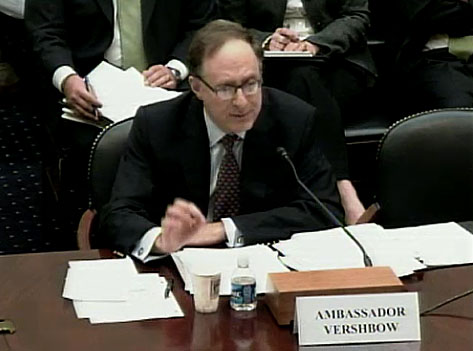
The House Committee on Foreign Affairs last week called a rare full committee hearing to discuss President Obama’s recent deployment of U.S. military advisors to assist in the effort to end the Lord’s Resistance Army, or LRA. The president’s decision, heralded by rights groups as a positive step toward finally ending LRA atrocities in Central Africa, drew initial criticism from some members of Congress over the authorization of the advisors. With Donald Yamamoto from the State Department and Alexander Vershbow from Defense called as witnesses, committee members posed questions about the scope of the mission. Constituents also had a chance to engage in the hearing through a new tool designed to elicit questions from the public. Some new details about the deployment emerged from the hearing.
Is this a peacekeeping mission? What will the role of the advisors be? The approximately 100 U.S. military personnel will be deployed to Central Africa in an advisory and liaising capacity to enhance the ability of allied African forces to apprehend Joseph Kony and his senior leaders, bring them to justice, and protect civilians.
Vershbow clarified that the advisors will be “primarily U.S. Army Special Forces." He informed committee members that "only a portion" of the U.S. personnel would directly advise and assist regional forces pursuing the LRA, while the majority will carry out logistical and other functions in support of the advisors. Their job, Vershbow said, will be to collaborate with the regional armies "to strengthen information-sharing, operational cooperation, and overall effectiveness" given that the regional armies lack the capacity to “acquire and process actionable information on the locations of LRA leaders and to convert that information quickly into operational plans.” He also stated that the advisors “will be sensitive to the challenges of civilian protection and will work to ensure that protection considerations are incorporated into operational planning … [and] seek to encourage defections."
How will we know if the mission is succeeding? Does the U.S. have an exit strategy? Secretaries Vershbow and Yamamoto emphasized that the mission will not be open-ended, but that it is instead a short-term deployment with specific objectives. Responding to the concerns members voiced about evaluating the success of the operation and the exit strategy, Vershbow was clear about the mission’s goals: Success will be evaluated based on the impact of the mission on LRA ranks. Specifically
[W]hether regional forces have successfully apprehended or removed top LRA commanders from the battlefield, facilitated large numbers of defections from the group, reduced the number of LRA attacks, and professionalized the troops engaged in this effort such that they can conduct effective military operations against the LRA and better protect their citizens.
Yamamoto said that the Obama administration "will regularly review and assess whether the advisory effort is sufficiently enhancing the regional effort to justify continued deployment,” adding that continued deployment would be conditioned on “sustained commitment and cooperation by regional governments." Vershbow emphasized this point, saying, “[I]f we do not believe our collective efforts are resulting in significant progress, we will not continue this deployment." He noted that the mission will be subject to review after a few months but did not offer a specific date.
What’s the budget? Representatives voiced concern about how much the advisory mission will cost and where the money will come from. Vershbow assured the committee that the cost would likely be in the “tens of millions” and promised a report with cost details.
But to those who have been following and documenting the massive suffering left in the wake of the LRA’s more than 20-year record of committing atrocities and destabilizing the region, the cost of supplying a mere 100 military personnel seems more than worth the possibility for long awaited peace, and the fulfillment of a promise to help that is long overdue.
How does the LRA effort connect to broader regional development? Some representatives remarked on the interconnectedness of terrorism and insecurity to efforts addressing the root causes of the region’s humanitarian crises. “The U.S. has made a big commitment to South Sudan; the LRA threatens to destabilize this new country,” explained Rep. Ed Royce (R-CA). “We’ve provided humanitarian relief when LRA attacks have forced millions to flee their homes. This deployment seeks to eliminate the root of these problems, and frankly, the need for these commitments.”
However, representatives also expressed skepticism about the availability of capable troops to partner on the ground. Rep. Royce voiced concern that Ugandan troops have been engaged in Somalia lately and that the most highly trained may be unavailable for operations against the LRA. Vershbow sought to allay concerns by telling the committee that in consultations with Ugandan President Museveni he expressed equal commitment to both fronts.
Those who have long awaited this strategic support have high expectations that the mission will open the doors to future successes for Central African allies fighting against the LRA. To be successful, the advisors should work closely with the forces pursuing the LRA to develop and coordinate a targeted apprehension strategy while improving oversight of operational planning and execution. In addition, their deployment should be combined with a larger effort by the U.S. as well as African and European countries – with the U.S. providing greater intelligence support, African countries supplying capable and committed special forces, and Europe contributing logistical assistance, including transport.
Photo: Assistant Secretary of Defense Alexander Vershbow testifies for the House Committee on Foreign Affairs

